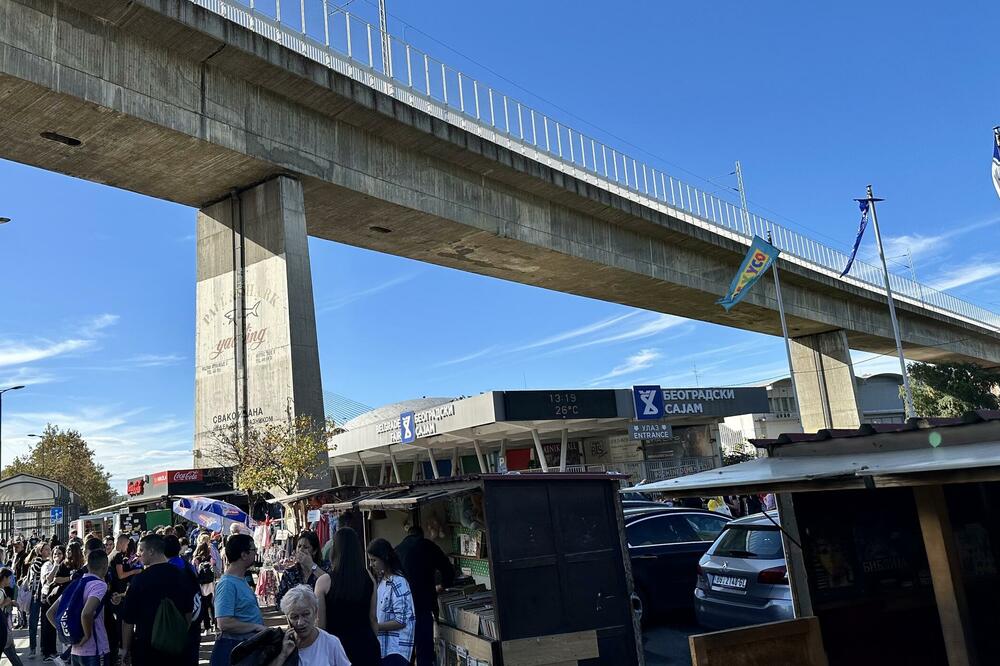The day is beautiful, the Miholy summer breaks all temperature records. But this time I am looking forward to walking around the halls of the Belgrade Fair less than usual. I cannot find the cause of the mild malice mingled with a tinge of remembrance. Maybe it's up to me.
Maybe it's the experience that dampens the magic. Several decades of participation in literary rituals - and the Belgrade Book Fair is one of the most massive - taught me the simple truth that the mostly mediocre and overly commercialized reality of the literary drive and my understanding of literature diverge to such an extent that it causes me discomfort. There is no love there, but there is the lowest common denominator - the book.
If I want to reach several hundred people who are ready to read at least one lyrical text, then I need a publisher. There are fewer and fewer of them in the era of the dictatorship of novels and the abundance of bad lyrics on social networks.
Or, if I want someone to publish my translation from German, then I have to offer it. Be that as it may, the fair is certainly a market where writers and translators are allowed the illusion that their spiritual product is needed by an ideal publisher who is ready to invest in it.
I guess we are looking for continuity in the repetition of rituals from the industry, so that we can more easily cope with a world that is changing more and more rapidly. In vain, the heroes of my student readings - Heraclitus or Kierkegaard, a millennium younger than him, warn that you cannot step into the same water twice and that there is no repetition. We like to believe that it is the same Fair before the pandemic, or even two, three or four decades ago. And it's not.
Since my first visit to the Belgrade Book Fair in the mid-eighties, the world in which I live has disintegrated and reconfigured several times. I am reminded of that by the titles on the stand with old books, which one almost collides with when exiting the Fair bus stop.
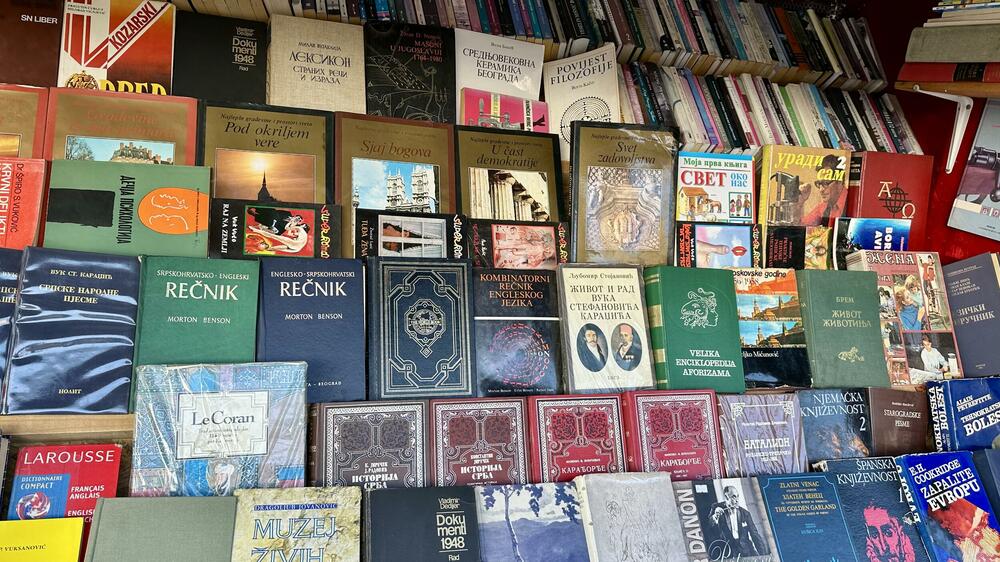
The title "History of Yugoslavia" signed by Ivan Božović, Sima Ćirković, Milorad Ekmečić and Vladimir Dedijer was published exactly half a century ago. In 1973, Yugoslavia was a fact. Today, even to us who were born and raised in that country, it seems like a distant dream. Sweet or nightmarish, as you like. There is also a Serbo-Croatian-English dictionary. One of those two languages nominally split into its constituent parts. And I published my first two books on it.
Going down to the fair
You have to reach the entrance to the Fair by an absurd path, descending from the stop deep into the underpass, of course without escalators, and then up again, to the other side of the tunnel. A huge billboard of one of the most prolific Serbian publicists of the last few decades, the star of Hepi's retro-chauvinist television jobs, former Hague detainee and convicted war criminal Vojislav Seselj awaits you in the tunnel. Did you think that you would see the faces of Andrić or Crnjanski on the approach to the temple of books? A contemporary writer? No. Vojvoda recommends his publications in which, in the language of the Red Ban, he incites nationalist demons in the title against those who do not agree to hate or who ideologically stand in his way. Belgrade Book Fair 2023.
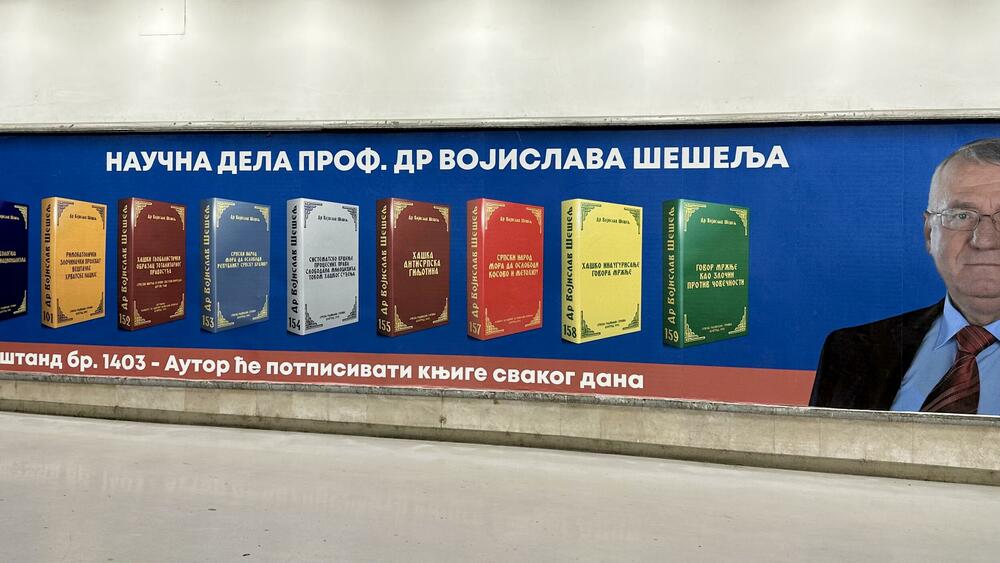
I note that the duke, who normally acts as Vučić's lawyer, has become one of the figures in the general reality show Serbia. The constant toxicity of public speech, blatant lying and spitting of dissidents on all channels, seemed to reduce the utility value of Šešelj and turned him into a worn and almost forgotten clown prototype. In a country where Seseljism has triumphed as a way of dealing, the progenitor has become redundant. For his consolation, the main director of the reality show is his best student.
People my age, with whom I am entering through the fair gates, have changed at least four citizenships without leaving their area. This is how history plays with those who believe that change does not concern them. They then happen to them.
Destroyers
The halls are still where they were last year. They are arranged in an illogical order for the visitor. Hall 1 is at the end. So I first pass by all those halls that will be demolished according to the will of the authorities. I can't help but think of Eric Clapton's concert in one of them, in the early eighties. Or to the fact that Television Belgrade broadcast its first show from the Fair. Writers such as Alain Rob-Grije, Erika Jong, Charles Simic and many others used to come here. The streak is about to end.
Belgrade on the water turns into a beast that swallows the surrounding substance. The entire right bank of the Sava from the late railway station to the Mostar loop is not enough for him. Now the Alavi construction team has also set its sights on the Belgrade Fair. They announced that they will demolish these halls, and for Expo 2027, older and more beautiful ones will be built, somewhere near Surčin.
Do not count on any resistance. Arriving at the Fair, I heard an elderly gentleman explaining to a lady that it was a good thing they were demolishing. "Where in the world is there a fair in the middle of the city?". The gentleman is obviously repeating the party phrases that he was teased on controlled channels. Who will explain to the gentleman that the biggest book fair in the world, the one in Frankfurt, is a fifteen-minute walk from the main train station?
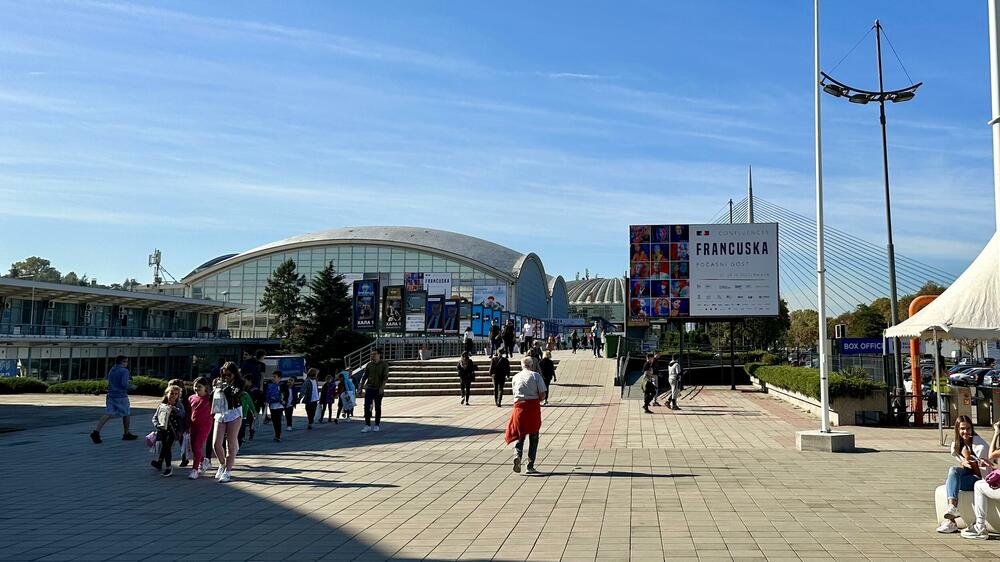
Maybe all this is making me a bit wistful? The thought that what I'm looking at, the kids and the librarians, who were dragged here on an excursion, the writers squinting in the sun with a coffee in the garden of the bistro at the entrance to the first hall, is actually the last time I'm seeing?
Hall 1, where I enter, is the only one they will spare, at least for now. It was probably saved by the fact that it is one of the pearls of modern architecture after the Second World War. Architect Milorad Pantović was educated in Belgrade, Berlin, Paris and New York during the time of the Yugoslav kingdom. He worked on projects for Le Corbusier for several years. But here he opted for Italian and Byzantine models, creating a unique building under the dome. With a span of 109 meters, it is said to be the largest prestressed concrete dome in the world.
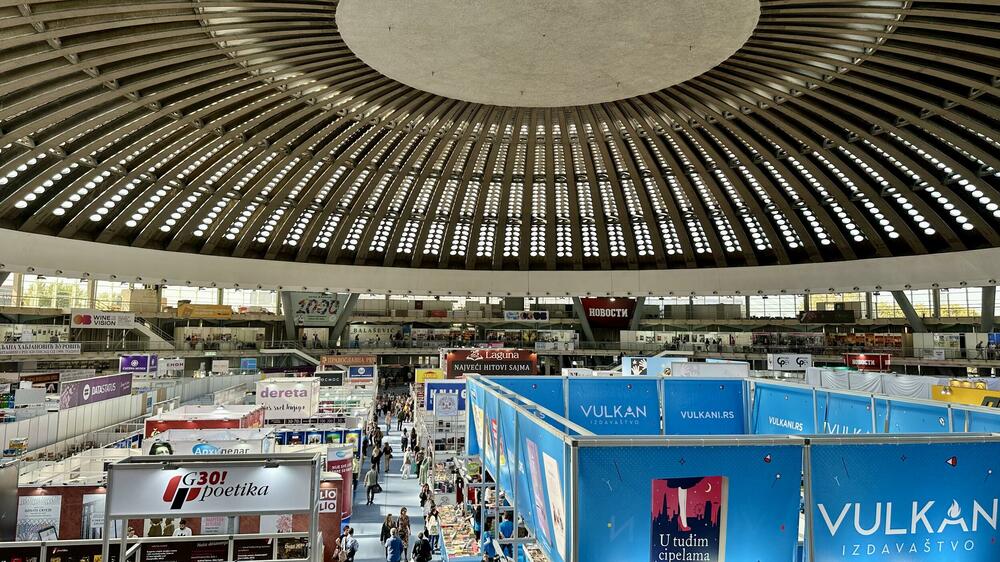
And really, only now, when the government in this country promises me that they will demolish the fair halls, and that they will willingly spare this beauty, I realize to what extent the Book Fair has gotten under my skin. I remember my first book at the "Svjetlosti" stand in Sarajevo. Then my truancy in the nineties. The reappearance of Bosnian, Croatian and Serbian publishers in the first two decades of this millennium. A series of translations. Anthologies signed by me.
In the false temple
I got to know the functioning of the pre-war and post-war literary scenes. Now I know - it's nicer just to read books. You meet a bunch of writers and you see that most of them are no less involved in partnership schemes than other people. People from the reading room kneeling to be close to the cauldron, in fringe-fringe combinations for awards and sinecures look particularly miserable. Me to you voivode, you to me serdar. And they do all this for less money than filmmakers or politicians.
Certainly, there is a significant number of those who persevere and write well despite all that. You just have to recognize them.
From above, light comes through the openings in the dome. Architect Milorad Pantović built a concrete temple in the midst of Yugoslav communism. Although the building is functional and secular, every successful dome has something of a sacred orientation to the firmament, in fact it is a replica of the heavens.
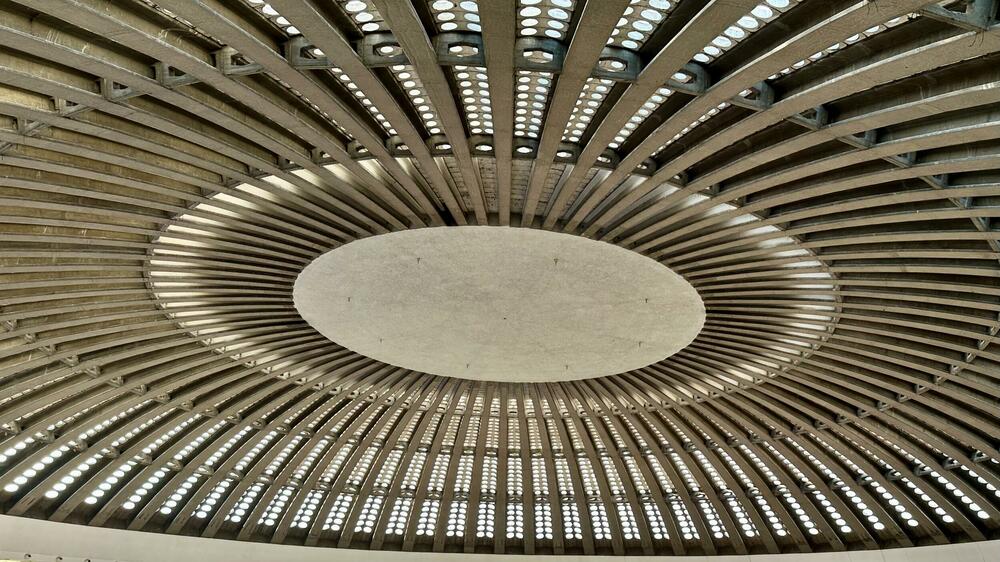
Mother was a teacher. It was not just a call to her, but an invitation. The cult of the book was nurtured in the house. This sight would make her happy - countless books under the dome. Temple of beauty and knowledge. Probably, after getting to know the stands in more detail, she would be surprised by today's Serbian publishing. Lots of homemade chauvinist thrash. Lots of Anglo-Saxon and native light rubbish. Starlets, criminals and war criminals as authors; musicians, fortune tellers and quacks as writers. And among them all of us, my lost literary tribe. In the midst of a realized postmodern utopia - anything goes. The old-fashioned among us still wish for laurels in the last century's way - some high-stakes speech in honor of a living classic in a hall full of gray heads. Two minutes in the cultural diary. But literary awards are privatized, ideologized and corrupted. The few literary magazines that have survived do not have the power of evaluation. Literary criticism retreated into the bastion of academia. The media uncritically transmits the publishers' marketing messages. Success today - virality on the networks, circulation, media presence. A successful writer is the hero of a side plot in a reality show.
Surface and position - a sign of power
I already know almost all the publishers lined up in the circular gallery and on the ground floor. The oval structure of the hall helps to constitute a visual hierarchy. Publishers with more money are lined up along the main corridor, which divides the hall like an apple into left and right halves. The stands between "Borislav Pekić Street" and "Iva Andrić Street" are within that corridor and show their commercial power by the number of rented square meters and the number of titles. On the left and right are their competitors, who have the same ambitions, but somewhat less power.
For me, like every year, it is a real pleasure to first visit the smaller stands in the circular gallery. My Serbian publishers are there - the National Library "Stefan Prvovenčani" from Kraljevo or the Cultural Center of Novi Sad, as the most famous addresses for poetry in Serbia, probably because they were nurtured by the poets Dejan Aleksić and Živorad Nedeljković in Kraljevo or Alen Bešić in Novi Sad. In the neighborhood is also the Partizanska knjiga, for which I translated from German the satires of Heinrich Bell and the stories written by the Luxembourgish writer Guy Helminger.
I go down to the bustle of the parterre, but I go in a semi-circle, along the wall behind which, I know, the Sava flows indifferently.
At the Treći trg publisher's stand, I find the books of this year's literary Nobel laureate, Jun Fose. Although he is best known as a playwright, he remained faithful to both poetry and prose.
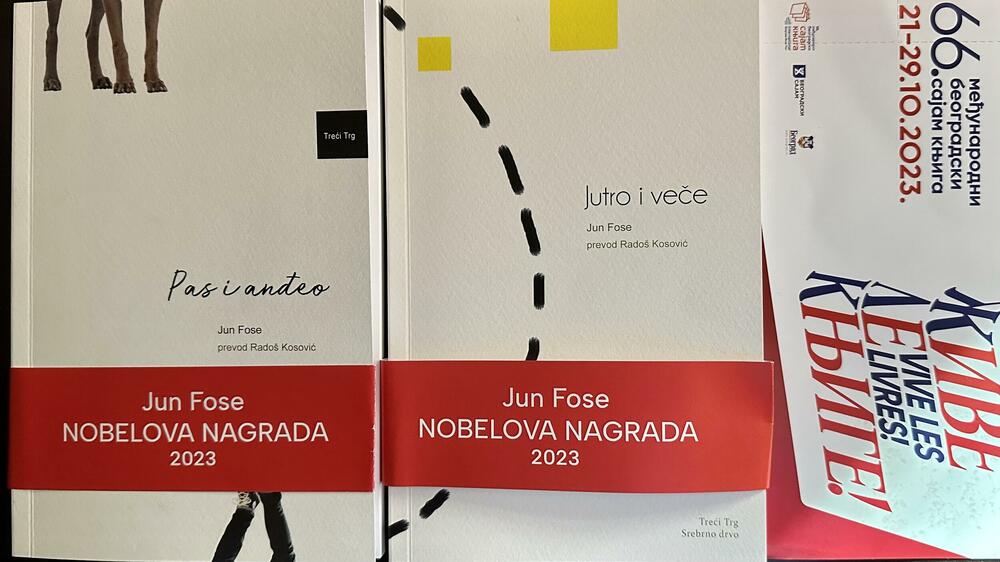
His lyric "Dog and Angel" was published by Treći Trg in 2019, and his prose "Morning and Evening" two years later. Radoš Kosović translated a number of titles from Norwegian, some of which I have in my library. I'm glad that actually the alternative publishing house had better taste than the major publishers. I will also have to look for the Blum publishing house that published Fosse's novel Melancholia.
I don't really go to the big ones anymore. There, the books mostly look like bonbons and roll by the kilo.
Who knows anything about death?
I could stop by the hall of old books and comics. Or to the restaurant upstairs. But I don't feel like getting into the time machine today. I met only a few acquaintances, exchanged a few sentences. I used to spend whole days here. I'm going home.
I cross the plateau in front of the hall, I walk slowly towards the exit.
By a clear decision of the management of the Fair, they removed from here a few years ago the kiosks with grills and the log cabins with gardens. They thought to bring order to the deep Balkans, but they only took the soul of the Book Fair. At the world's largest book fair in Frankfurt, the food is mostly bad and overpriced. She was good here. Only inexperienced Skorojevics can think that the burger is the enemy of literature.
I am thinking about how the cancerous fabric of Belgrade is spreading on the water along the right bank of the Sava, without the intention of stopping all the way to Ada. And with one branch, he certainly intends to penetrate the Hippodrome, in the area between Senjak and Košutnjak.
Should I say goodbye to the other halls? Who knows. Maybe it won't happen so soon. The people who came up with the demolition of the Belgrade Fair are the same people who promised the subway. The only hope for these halls, for the place I love, is the sloppiness of the powerful in fulfilling their promises, their arbitrary and inconsistent direction of the Sešeljev reality show.
This year, France is the guest of honor at the fair. The motto is therefore consistent: “Vive les livres! Long live books!” This is usually the greeting of rulers who will live a short time.
In the transport to Banovo brdo, I read the verses of Jun Fosse. That poetry doesn't open up to me right away. Right down to the verse:
Because who knows anything about death
except this: there is no greater shame
I feel that as an epitaph for fair halls. For an era and its books.
Bonus video:



